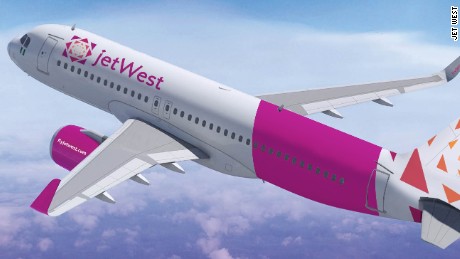Nigeria’s newest airline prepares for take off as storm clouds gather
June 16, 20171.4K views0 comments
Nigeria’s aviation industry has suffered a prolonged spell of violent turbulence.
The nation’s leading carrier was recently taken over by the government to prevent it collapsing. A crumbling runway closed the capital’s international airport for six weeks. The whole sector has been battered by Nigeria’s recession that has driven up costs and made foreign currency scarce.
But despite the gloomy conditions, a new and ambitious airline is being cleared for take-off.
JetWest could make its maiden voyage in December, and the team behind it is aiming high. ‘Democratize the skies’
Democratize the skies’
Read Also:
The venture’s founder is Dikko Nwachukwu, a serial entrepreneur with a background in aviation. His mission statement is simple.
“The guiding vision for JetWest is to make air travel accessible for more people,” says Nwachukwu. “We are about democratizing the skies.”
Just 15.2 million passengers passed through Nigerian airports in 2016, according to official statistics.
Nwachukwu sees opportunity in the vast market unserved by existing airlines. Nigeria has by far the largest population in Africa, and the entrepreneur draws inspiration from rapid progress in another technology field.
“We want to do for travel what cell phones did for telecoms,” he says bullishly. “Fifteen years ago there were less than one million phone lines in Nigeria and now there are 100 million…We could have 100 million (air) travelers, and I know jetWest will be in the middle of the revolution.”
Future facing
JetWest aims to project a fresh and vibrant image. The company’s social media accounts are already trailing colorful cocktails and memes ahead of launch, aimed at youthful, savvy consumers.
Such consumers may also be attracted to the airline’s core selling point: value. JetWest will offer a pared down service “more Easyjet than Etihad” at rock-bottom prices.
“We will cut out everything not core to the business and focus on getting fliers from A to B,” says Nwachukwu. “Beyond that, we will have unbundled services so customers can pick and choose what they want.”
Given the high cost and risk involved with launching a fleet in Nigeria’s current economic climate, the entrepreneur is mindful of the need to find efficiencies. He suggests the company might pool resources with other airlines.
More ambitiously, the business model will rely on innovation. JetWest is developing its own proprietary technologies in-house, drawing on the best talent from Nigeria’s renowned start-up scene, in a conscious effort to boost local industry as well to avoid costly rental equipment. The company intends to eventually supply technology to other airlines.
Not plane sailing
The new airline’s strategy is for rapid expansion.
If all goes to plan, jetWest will launch this year with 100 employees and a fleet of three Airbus A320 jets flying local routes in Nigeria.
That could expand to 15 planes within three years, and 40 within five, carrying over 10 million passengers a year. The company hopes this will cover neighboring countries in the region.
But not all analysts are convinced that such a smooth ascent will materialize.
“Nigeria looks like a low-cost operator’s dream with massive population density,” says Ivan Nadalet, vice president at industry analysts’ CH Aviation. “But Nigeria is a very difficult operating environment…the economy has collapsed and there is no foreign exchange, so it is very difficult to get revenue out of the country for leases.”
Nadalet adds that jetWest may struggle to secure access to the airspace of neighboring countries, where governments might fear competition that undercuts their own fleets.
Nigerian aviation has struggled in recent years, with leading carrier Arik Air subject to a government takeover to prevent its collapse.
Nigerian aviation has struggled in recent years, with leading carrier Arik Air subject to a government takeover to prevent its collapse.
Patriotic duty
Nwachukwu is aware of the scale of the challenge. He lists several other industries that would be easier to turn a profit in.
But difficulty is part of the motivation, and he believes that aviation is key to dragging Nigeria out of its malaise.
“We know for sure that economic development is tied to transport,” he says. “If we don’t have the transport for business, for friends and family to see each other, we will remain stagnant and we will not see growth.”
The entrepreneur is confident that if jetWest can make gains it will lead to wider progress in the industry, and more support from the government in areas such as access to airspace. He gives the example of AirAsia in Malaysia, which helped the country boom with help from politicians.
But even without support, Nwachukwu is confident in his concept, his team, and his reading of the region.
“I do an enormous amount of travel across the country and I know how important it is for me,” he says. “If other people could, they would. West Africans travel more than anyone else for business, friends and family.”
The bet is high-risk. The payoff could be spectacular.

Courtesy CNN
